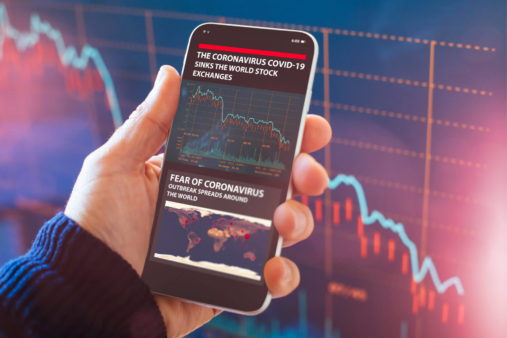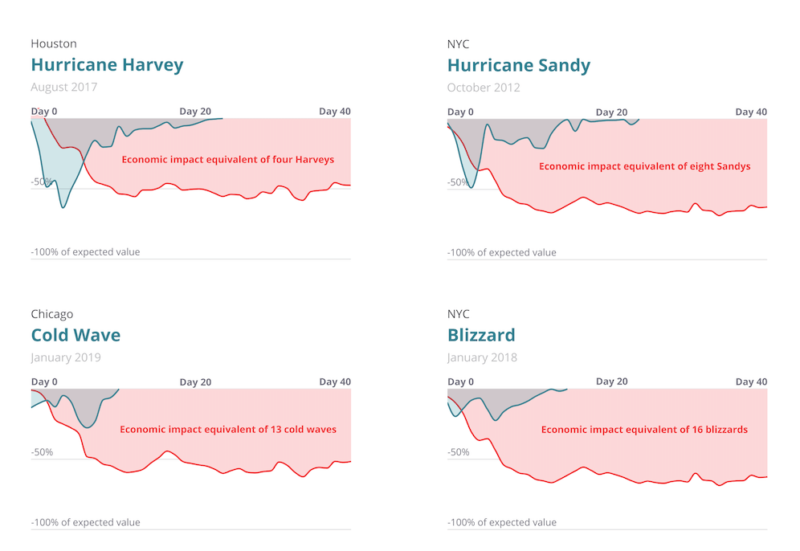Destructive impact of coronavirus on SMBs greater than an ‘economic hurricane’

Yelp analysis finds the devastation is 4X the magnitude of the biggest economic shocks of the past decade.
According to a Brookings analysis, 48 million jobs are at risk from small businesses collapsing. Another analysis asserts that as many as one-third of all SMBs in the U.S. are at “risk of closure” over the next two to five months.
SMB failures will impact digital agencies. Beyond the destruction of lives and communities, this matters to marketers because SMBs spend, in aggregate, billions on marketing, a meaningful percentage of which flows through digital agencies. If there are large-scale small businesses failures — in the millions — that would have a very direct impact on the agencies, SaaS platforms and martech companies that serve them. For example, the majority of Facebook’s 7 million active advertisers are small businesses.
A new report out this morning from Yelp tries to quantify the impact of COVID-19 on small businesses. Using a variety of internal data from Yelp’s platform, the company says the economic impact of the pandemic has been “unlike anything” it has seen in its 15 years of existence.

The biggest economic shock of the decade. Yelp likened COVID-19 and its fallout to “several hurricanes worth of local economic upheaval across the U.S.” Yelp explains the overall impact on local urban economies “amounted to four or more times the magnitude of the biggest prior economic shocks they’d experienced in the last decade, such as major hurricanes.”
Among the findings in the report:
- Business closure rates grew by 200% or more in metro areas and states across the U.S.
- As of April 19, more than 175,000 businesses shut down (either temporarily or permanently).
- The largest number of SMB business closures were in the LA metro area, followed by New York and Chicago. Seattle and San Francisco have the highest percentage of business closures compared with the total number of SMBs in those cities.
- Among major cities, Philadelphia and Miami have the lowest business closure rates.
- Closed businesses include “more than 48,000 shopping establishments, 30,000 restaurants, and 24,000 spas and other beauty businesses.”
Interest and search activity declined by 50%. Following the stay-at-home orders, consumer interest “in all local businesses plummeted, by 50% or more in many categories, in a matter of a week or two.” Yelp explains that consumer behavior (e.g., search) often shifted immediately before and anticipated the government’s lockdown orders.
Comparing economic impact of natural disasters and COVID

The graphic above compares COVID-19’s local economic impact (according to Yelp metrics) to recent natural disasters. COVID-19 is both larger and much more sustained — and it isn’t over yet.
Reviews reflect consumer support, mention virus. From a consumer-demand perspective the hardest-hit categories on Yelp were bars and nightlife, salons, hotels and travel companies, and restaurants. However, Yelp also points to other categories and examples of SMB resilience, creativity and even increased demand in certain categories.
Unlike Google, Yelp didn’t pause reviews. It explains that reviews often explicitly discuss health measures taken by establishments. Yelp also says, “roughly one in six reviewers each day mentioned [the pandemic] by one of its names, a staggeringly high rate seen for few other types of phrases in our reviews.”
Why we should care. Google hasn’t issued a comparable report, but if it did, I suspect the numbers would be significantly amplified. Indeed, an early April survey of more than 200,000 SMBs across North America found that 90% have been negatively impacted by COVID-19. And, most SMBs have only about a month’s worth of cash reserves, according to customer account data from JPMorgan Chase.
As cities and towns open back up over the next two months, we’ll see how many SMBs return and how many are lost. Let’s hope SMB closures are more temporary than permanent, because significant failure rates will send a massive shock through the digital marketing ecosystem.



